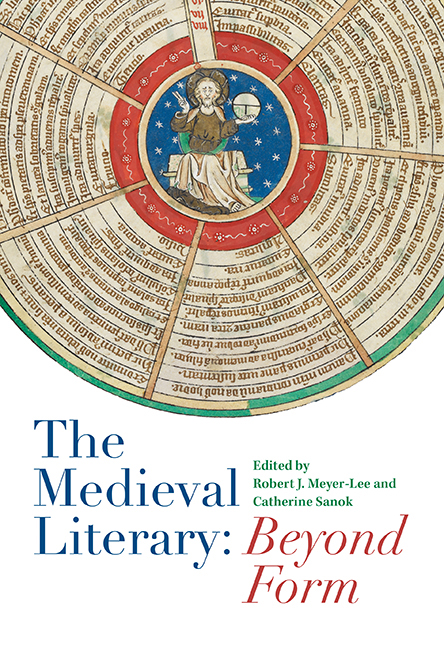Book contents
- Frontmatter
- Contents
- List of Illustrations
- Acknowledgments
- List of Contributors
- List of Abbreviations
- Introduction: The Literary through – or beyond? – Form
- I Instrumental Forms
- II Form Performed
- 4 Rhymed Alliterative Verse in Mise en page Transition: Two Case Studies in English Poetic Hybridity
- 5 Idiot Psalms: Sound, Style, and the Performance of the Literary in the Towneley Shepherds’ Plays
- 6 Inaudible Music
- III Temporalities of Form
- Index
4 - Rhymed Alliterative Verse in Mise en page Transition: Two Case Studies in English Poetic Hybridity
from II - Form Performed
Published online by Cambridge University Press: 12 October 2019
- Frontmatter
- Contents
- List of Illustrations
- Acknowledgments
- List of Contributors
- List of Abbreviations
- Introduction: The Literary through – or beyond? – Form
- I Instrumental Forms
- II Form Performed
- 4 Rhymed Alliterative Verse in Mise en page Transition: Two Case Studies in English Poetic Hybridity
- 5 Idiot Psalms: Sound, Style, and the Performance of the Literary in the Towneley Shepherds’ Plays
- 6 Inaudible Music
- III Temporalities of Form
- Index
Summary
We take up here an issue that is becoming increasingly urgent for New Formalist studies: how verse is lineated or set out in surviving medieval manuscripts, and how the decisive moment of arranging a text on the page reveals an authorial or scribal awareness of transitions in form. In such moments, we argue, authors or scribes looked both backward toward their forebears for inspiration and also outward toward new multicultural influences as English poetry developed. As the work of Ardis Butterfield and many other scholars of manuscript studies over three decades has shown, contextualizing poetic form in its manuscript presentation illuminates the “poetically engaging” moment when the pre-written, notional sense of a poem “is negotiated into written form by medieval poets.” In the (re)turn to formalism, the urgency of this contextualization lies in our collective interest in preserving the benefits that decades of historical and historicist scholarship have given to the field, in no small way thanks to interest in manuscripts. New Criticism operated in a world largely innocent of manuscript studies: manuscripts were considered important only to editors, whose job was to mediate between the inconvenient, often obscure manuscript page and the comforts of modern print. While mid-twentieth-century scholars usually had enough old-school philology to know that editors had regularized Middle English orthography, they had little interest in how their editors had regulated form, creating metrically tidy lyrics even where a scribe had emphasized fluidity or its playful possibilities. And even New Criticism's editors regarded paleography as the purview of a handful of temporarily useful specialists, who, they imagined, had little to contribute beyond transcription and dating. Paleography for vernacular texts was also slow to develop: in his memoirs, for instance, George Kane records the great difficulty he had even finding a paleographer willing to deal with Middle English when he was first editing the A-text of Piers Plowman. All that began to change only when innovative paleographers such as Malcolm Parkes and Ian Doyle began to excavate medieval terminology for book organization (e.g., the term ordinatio, stemming from the Oxford requirement that medieval lecturers discuss the organization and structure of a prescribed text), and when editors such as Derek Pearsall began to realize that manuscripts did not just transmit stories, but could also tell them.
- Type
- Chapter
- Information
- The Medieval Literary: Beyond Form , pp. 87 - 118Publisher: Boydell & BrewerPrint publication year: 2018
- 2
- Cited by



